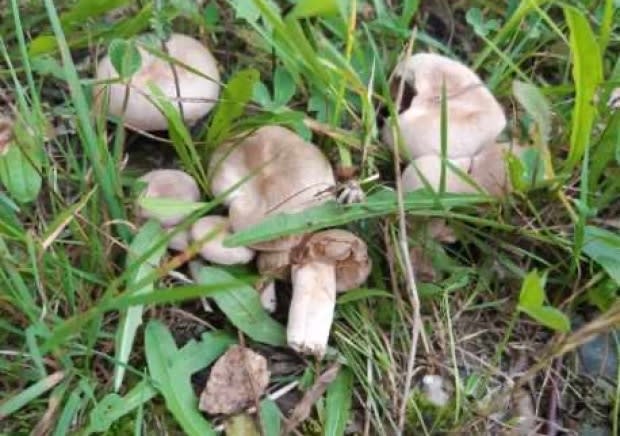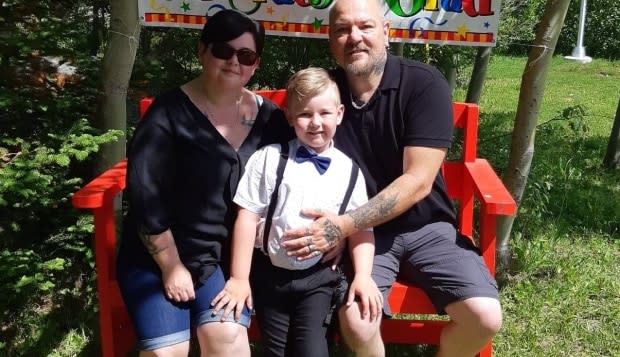After a mushroom sent her son to the ER, this Lumsden mom has a warning
Paula Tulk will never know exactly what kind of mushroom her son ate on his first day of school, but it will be hard to forget the stress of the ensuing ordeal that sent her son to hospital with his entire family fearing for his life.
Alexander Tulk, 6, came home from his first day of Grade 1 on Sept. 9 at Lumsden Academy "pretty happy, but pretty lethargic as well, saying that he had a tummy ache," said Tulk.
Shortly after supper, still in pain, Alexander told his parents he had eaten a mushroom at school, sending his mom into "pure panic, absolute panic," she said.
Tulk, her husband and Alexander went to the schoolyard to try to figure out what type of mushroom it was, but there were several types growing and they couldn't tell, despite taking pictures and sharing them on a Facebook mushroom page for help.
Tulk took Alexander to a medical clinic while a friend, and local forager, continued to search the yard with Alexander's father. They all reconvened at home after Alexander was discharged, with Tulk advised to monitor her son for certain symptoms.
Alexander's pain and diarrhea grew worse, and at 11 p.m., a stranger knocked at the door — a mushroom expert who had caught wind of what happened. Tulk said they were advised there was "a 50-50 chance your child ate a poisonous mushroom" — possibly a white amanita, the most toxic of all North American mushrooms — and urged them to go to the emergency room at the Gander hospital.

ER experience
The family hit the road, and the doctors were waiting for them when they arrived.
"They came and they briefed us of the things that they were going to be doing to him," Tulk said, as doctors hooked him up to an IV to flush his system, drew blood and tested it every few hours, and continually monitored him.
There were discussions of airlifting Alexander, Tulk said, as the doctors worried about the type of mushroom involved.
"This poisonous mushroom starts liquefying your organs, it starts with your liver and your kidney first. At that point there's absolutely nothing that they can do for you here, because it's such a remote area that there is not antidote," she said.
Children need a safe place to play at school. - Paula Tulk
But as continual rounds of blood work came back with stable results, Alexander was discharged, and his family were told to stay nearby and return for samples the following day. More testing followed, and by Sept. 13, doctors declared Alexander in the clear.
Relief flooded through the household.
"It's something I'm never going to be able to describe to anybody. You just have this huge weight off of your chest and off of your heart," Tulk told CBC Radio's St. John's Morning Show.
School yard safety
Nearly two weeks later, the ordeal's aftermath lingers, and Alexander is still having a hard time.
"We have to have daily talks with him about it. He's still scared that something's going to happen to him," said Tulk.
Tulk doesn't want her son, or any child, to have to relive that experience, and she wrote to the school board asking for changes — to install warning signs, and to spray the yard with a fungicide.
"Their concerns was that the anti-fungal spray would not be safe for the children to play in," she said.
"If that's the case, they need to come up with a brand new area for our children to play that is safe."

The Newfoundland and Labrador English School District confirmed it is not considering using fungicide, but in a statement to CBC News said staff are conducting daily inspections of the yard until colder weather sets in.
"Staff have also spoken with students about the potential dangers of consuming something unknown," the statement reads, in part.
"There has also been an added emphasis placed on supervision during free time outdoors, particularly for the younger grades."
Still, Tulk would like to see greater safety after all her family has been through. Adding to the burden, two days after Alexander got the all-clear, his father had a massive heart attack.
"We were told that the panic and the worry and the concern and the stress from Alexander's ordeal put Steven into a massive heart attack," said Tulk.
Her husband is on the mend, she said, crediting family and friends for stepping up during the medical emergencies to see them through. She hopes lasting changes come to her child's school.
"Children need a safe place to play at school. We shouldn't have to worry about our children's safety while they're there."
Read more from CBC Newfoundland and Labrador


